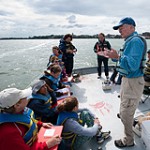Tag Biosciences
Curiosities: How long can bacteria live outside humans?
Bacteria have vastly different survival abilities, says Jeri Barak, an assistant professor of plant pathology at UW–Madison. Many species normally live in soil…
GLBRC receives $8 million in Recovery Act funding
The Department of Energy (DOE) Great Lakes Bioenergy Research Center (GLBRC) has received $8.099 million in new funding from the U.S. Department of Energy through the American Recovery and Reinvestment Act to provide crucial support for plant cell wall imaging and sustainability research.
Curiosities: Why do onions make us cry when we cut them?
Chopping onions unleashes a “chemical defense that onion plants have to protect themselves against insects and microbes,” says UW–Madison horticulture professor Irwin Goldman. We’re…
Curiosities: Are there more geese in Wisconsin than there used to be?
The number of Canada geese in Wisconsin is very much on the rise, increasing exponentially since standardized bird counts began in 1966, according to…
UW-Madison symposium addresses science’s holiest grail: building life from scratch
While at the University of Wisconsin–Madison, biochemist Har Gobind Khorana helped crack the genetic code, completing a set of experiments that garnered him a Nobel Prize in 1968.
Do Chicago’s suburbs hold the key to understanding West Nile virus?
For a group of UW–Madison epidemiologists, the Chicago suburbs near Oak Lawn are proving to be the perfect laboratory for prying loose the secrets of West Nile virus, a pathogen carried by mosquitoes and birds that infects and sickens thousands of people each summer.
Slide show: Blooming limnologists
The limnology “major”, one of 18 offered at this year’s Grandparents University, takes grandparents and their grandchildren on to Lake Mendota to collect samples and test the water for oxygen and temperature while aboard Limnos, a 28-foot research boat.
Study suggests H1N1 virus more dangerous than suspected
A new, highly detailed study of the H1N1 flu virus shows that the pathogen is more virulent than previously thought.
UW-Madison researcher wins White House science award
A University of Wisconsin–Madison bacteriologist and evolutionary biologist is one of the country's brightest young scientific minds, according to the White House.
Five big ideas to fill out Wisconsin Institute for Discovery portfolio
Capping an intensely competitive process, five proposals from University of Wisconsin–Madison faculty have been selected to form the intellectual heart of the Wisconsin Institute for Discovery (WID).
Sequencing effort to chart ants and their ecosystem
Nestled within the twisting fungus gardens of leaf-cutter ants exists a complex symbiotic web that has evolved over millions of years. Now, with the help of a major genomic sequencing grant from Roche Applied Science, scientists at UW–Madison will be able to analyze these interactions at the molecular scale.
Major study links malaria mosquitoes to Amazon deforestation
In one of the most field-intensive efforts to explore the connection between malaria and tropical deforestation, a team led by Jonathan Patz, a specialist in the link between environment and health at the Nelson Institute for Environmental Studies at UW–Madison, has established a strong correlation between the extent of forest destruction and the incidence of the Amazon's most dangerous malaria vector, the mosquito Anopheles darlingi.
Expert on relationship between animals and bacteria wins Guggenheim honor
University of Wisconsin–Madison developmental biologist Margaret McFall-Ngai has been awarded a prestigious Guggenheim Fellowship, a one-year grant that will support her investigation into how animals interact with their natural complement of microbes.
UW-Madison researchers study salt’s potential to store energy
At UW–Madison, researchers see potential for storing heat in a mineral found on kitchen counters and restaurant tables worldwide. They're studying salt.
Notable graduates: Krista Stewart — Collaborating her passion for music with a fervor for research
Krista Stewart, a UW–Madison senior majoring in molecular biology, has not only managed to graduate in two-and-a-half years with a bachelor degree, but also has managed to juggle her intensive undergraduate research with her love for music.
Graduate student recognized for biofuels advance
In recognition of the earth-friendly biofuel technology he helped develop, a University of Wisconsin–Madison graduate student has been selected to receive a prestigious national award from the American Chemical Society.
Thirty-plus medical inventions debut at undergraduate design competition
On Friday, May 1, some 150 University of Wisconsin–Madison biomedical engineering students will showcase 34 novel devices that address myriad real-world medical challenges.
Sustainability to be focus of annual bioethics forum
Sustainability will be the focus of the eighth annual International Bioethics Forum to be held in Madison Thursday and Friday, April 23 and 24.
UW-Madison students strive to improve medical care around the world
When Amit Nimunkar returned to his home in India for a visit with family, the University of Wisconsin–Madison biomedical engineering (BME) graduate student told his grandmother about the exciting BME projects he was working on.
Breakthrough device to debut at National Eye Institute’s 40th anniversary kickoff event
A portable vision device that provides blind individuals sensory input similar to vision will be presented at the 40th anniversary celebration for the National Eye Institute, part of the National Institutes of Health, on Friday, April 3.







